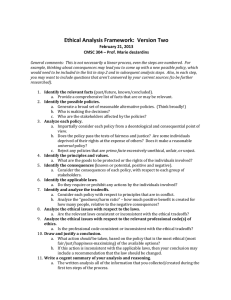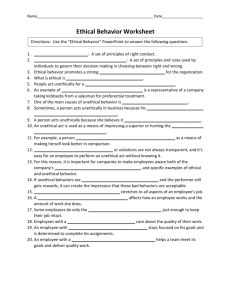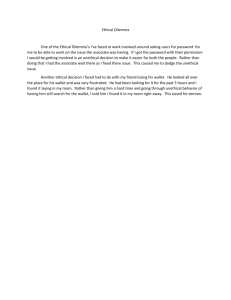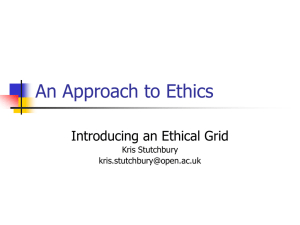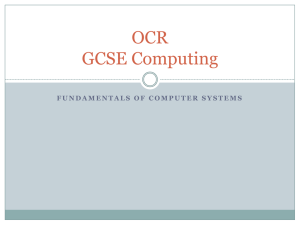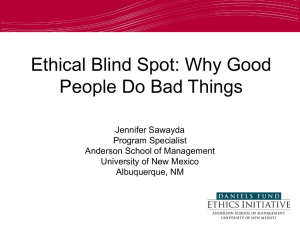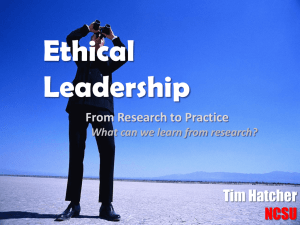Slides
advertisement
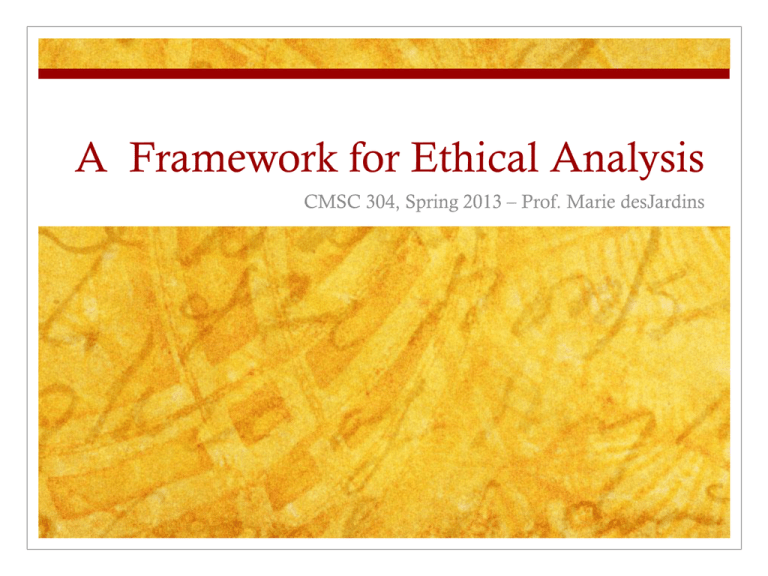
A Framework for Ethical Analysis CMSC 304, Spring 2013 – Prof. Marie desJardins Teamwork Roles In some classes, groups will need to establish roles, which may include: Facilitator –keeps the discussion on track, ensures everyone is participating and that you’re using your time well Scribe – takes notes and takes the lead on preparing a written assignment for submission, if one is required Expert – reads the assigned supplementary reading before class Spokesperson – gives the oral presentation to the rest of the class, if needed Experts will be needed for some classes in which there is supplementary reading – these should be decided by the team in advance, and rotated equally over the course of the semester. Other roles (in grey) are optional, at least for now For today, you MAY wish to have a facilitator and a scribe 2 Moor’s JustConsequentialism Combine deontological and consequential reasoning Core values: What “goods” do we want to protect? “(life, happiness, abilities, security, knowledge, freedom, opportunities, and resources)” [Tavani p41] Causing an individual to lose any of these goods is “doing harm,” which is to be avoided Protect justice, rights, and duties Societal obligations: keep your promises, obey the law, satisfy (explicit or implicit) contractual duties 3 Just-Consequentialism: Resolving Conflicts Deliberation stage: consider possible policies, not as an individual case but as a general rule. (Some can be ruled out entirely at this stage, as unjust or unethical.) Selection stage: weigh the positive and negative consequences of the remaining policies, carefully identifying and analyzing these consequences and the tradeoffs 4 A Concrete Methodology 1. Identify the relevant facts (past/future, known/concluded) 2. Identify the possible policies A. Who is making the decisions? B. Who are the stakeholders affected by the policies? (Remember to think broadly!) Analyze each policy impartially, from a deontological and consequential point of view 3. A. Does the policy pass the tests of fairness and justice? Are some individuals deprived of their rights at the expense of others? Does it make a reasonable universal policy? B. Reject any policies that are prima facie unethical, unfair, or unjust 5 Methodology, cont. 4. Identify the principles and values that should be factored into a tradeoff analysis – what are the goods to be protected or the rights of the individuals involved? 5. Identify the consequences (known or potential, positive and negative) of each policy, with respect to each group of stakeholders 6. Identify the laws that may govern the actions taken by the individuals in this situation. Do they require or prohibit any actions? 6 Methodology cont. 7. Identify and analyze the tradeoffs involved in each policy, with respect to consequences and principles that come into conflict. Analyze the “goodness/harm ratio” – how much positive benefit is created, relative to the negative consequences? 8. Analyze the ethical issues with respect to the laws. Are the relevant laws consistent or inconsistent with the apparent ethical tradeoffs? 9. Analyze the ethical issues with respect to the relevant professional code(s) of ethics. Is the professional code consistent or inconsistent with the apparent ethical tradeoffs? 7 Methodology cont. 10. Draw a conclusion – that is, the action that should be taken, based on the policy that is the most ethical (fair/just/happinessmaximizing) of the available options. (If this action is inconsistent with the applicable laws, then your conclusion may include a recommendation that the law should be changed.) 11. Write a cogent summary of your analysis and reasoning, including all of the information that you collected/created during the first nine steps of the process. 8 Your Case to Consider Read the short paragraphs in the handout, focusing on item III, the decision about whether to impose mandatory drug tests Apply the steps of the methodology that I’ve presented above http://onlineethics.org/Resources/Cases/Drinking.aspx You can skip #8 and #10; you may use your prior beliefs about laws for #5 and #7 Optionally (after you finish your initial analysis): Read the commentaries at the URL in the handout Discuss which of the commentators reached the same conclusions. Do any of the commentaries cause you to change your analysis? 9 Post-Class Assignment Within the next week, submit your written notes on the case. (One submission per team.) 1. They should be neat, legible, and grammatical, but do not need to be written as a full report (bullets/notes are OK) They should be organized by the steps of the methodology Also, either at the end of class or within the next week, submit a marked-up copy of the “Ethical Analysis Framework” handout, which can include: 2. Wording changes. Clarifications in or changes to the directions. Additional steps that you think should be followed. Questions about the analysis framework that you are left with after today’s class. 10
